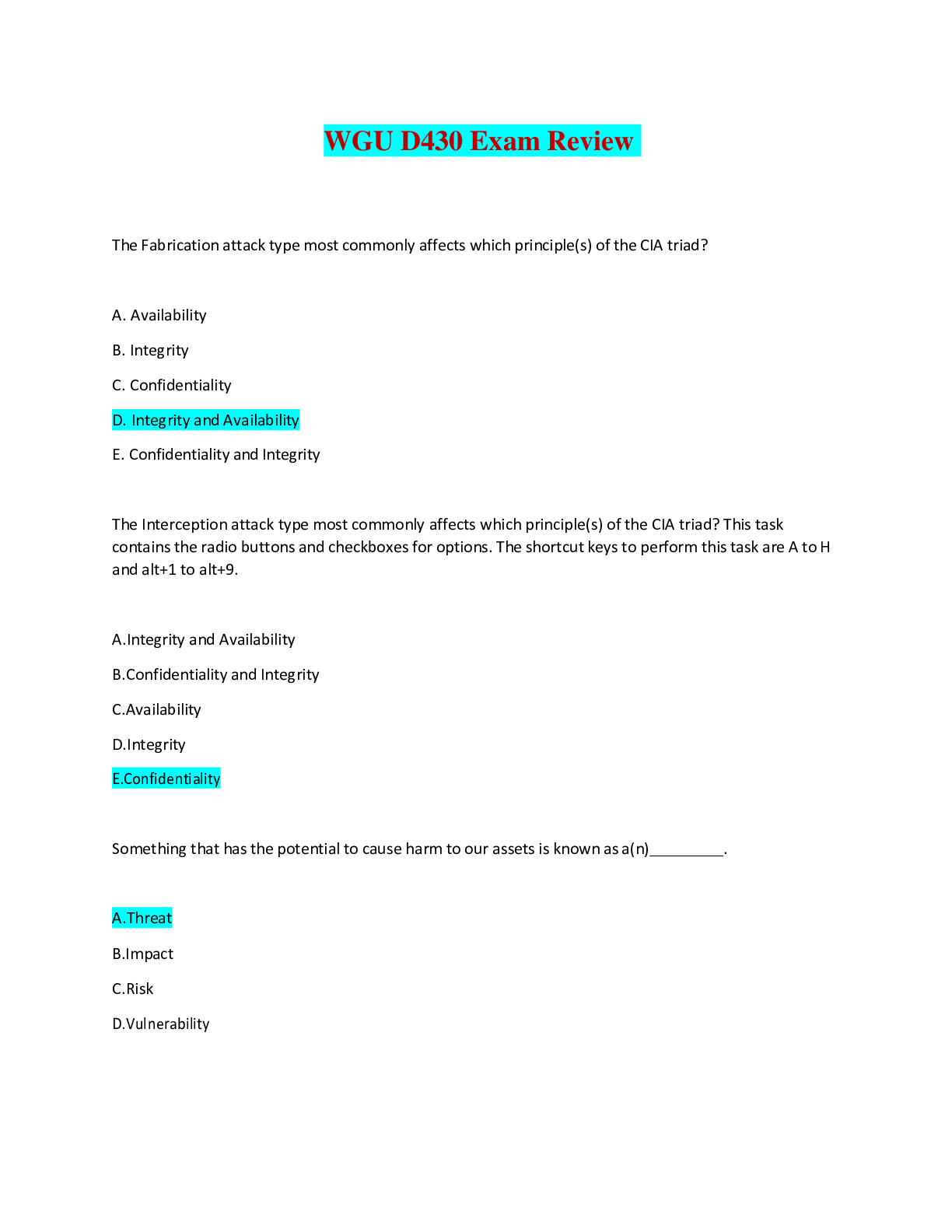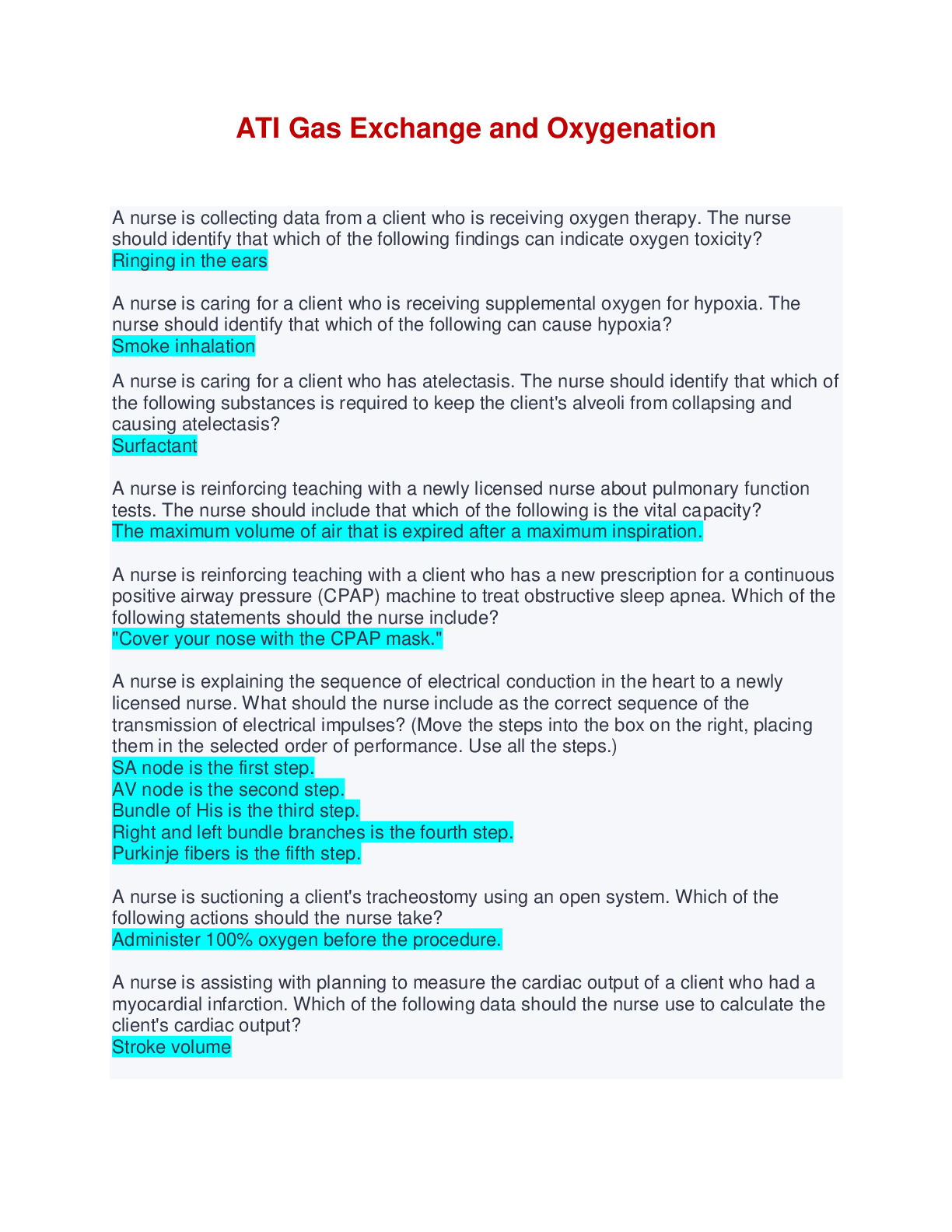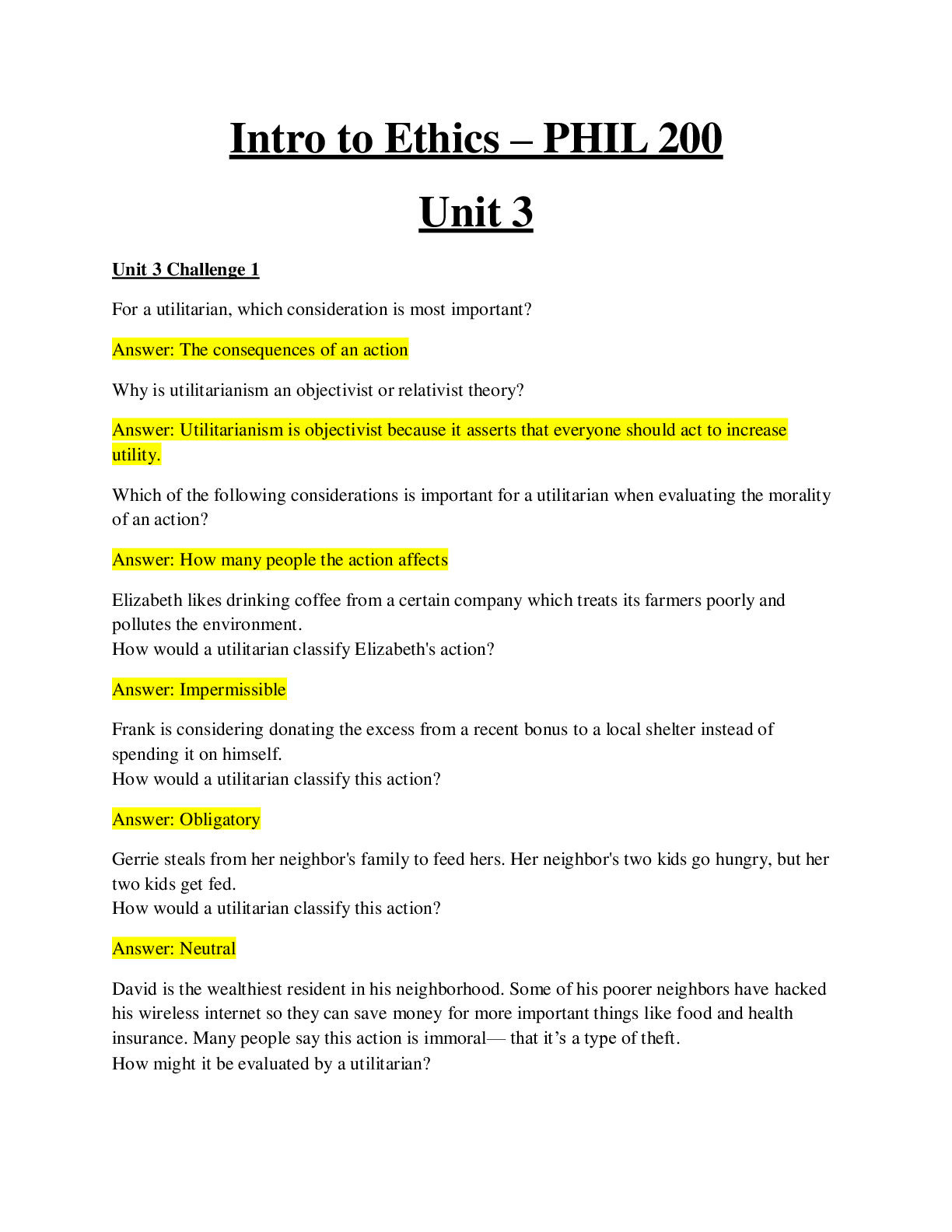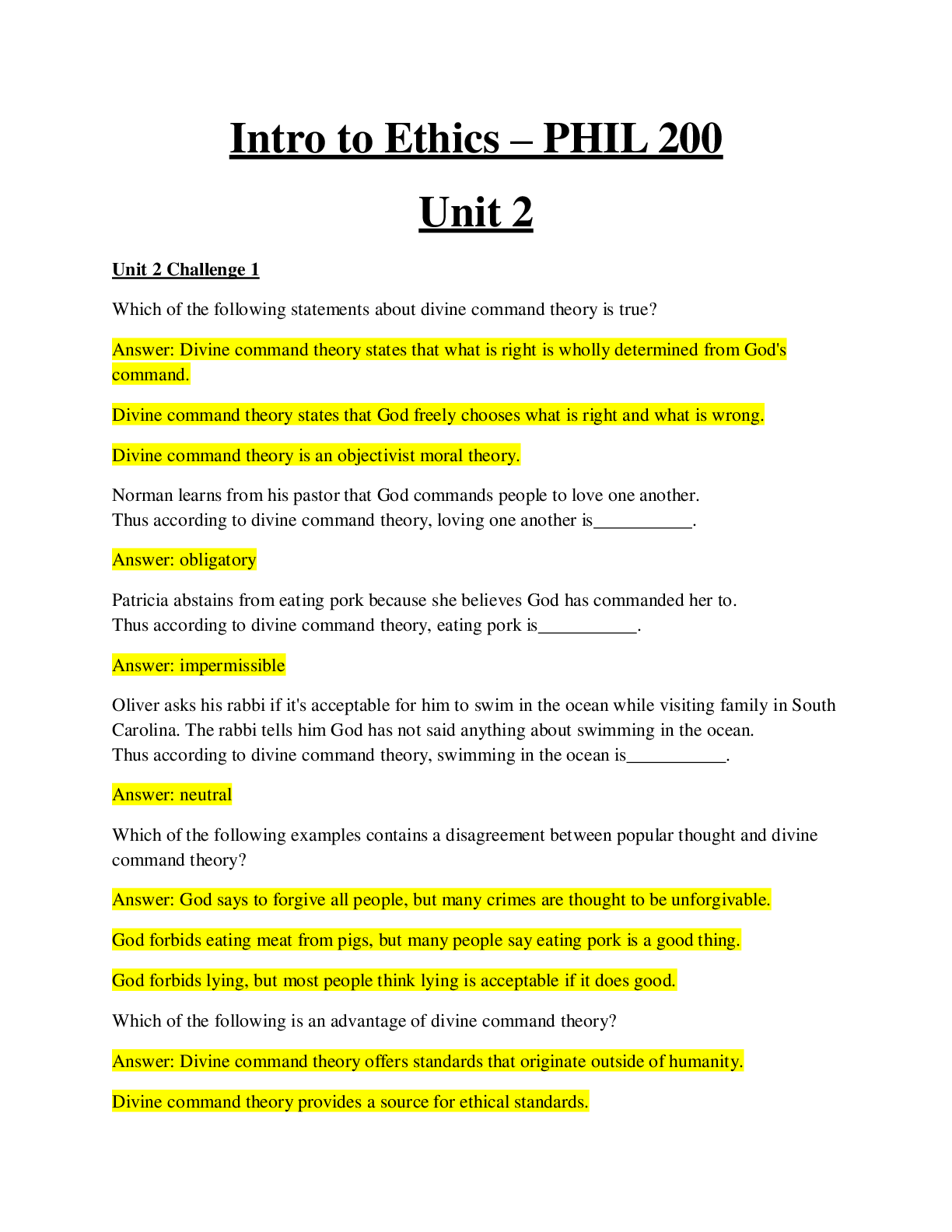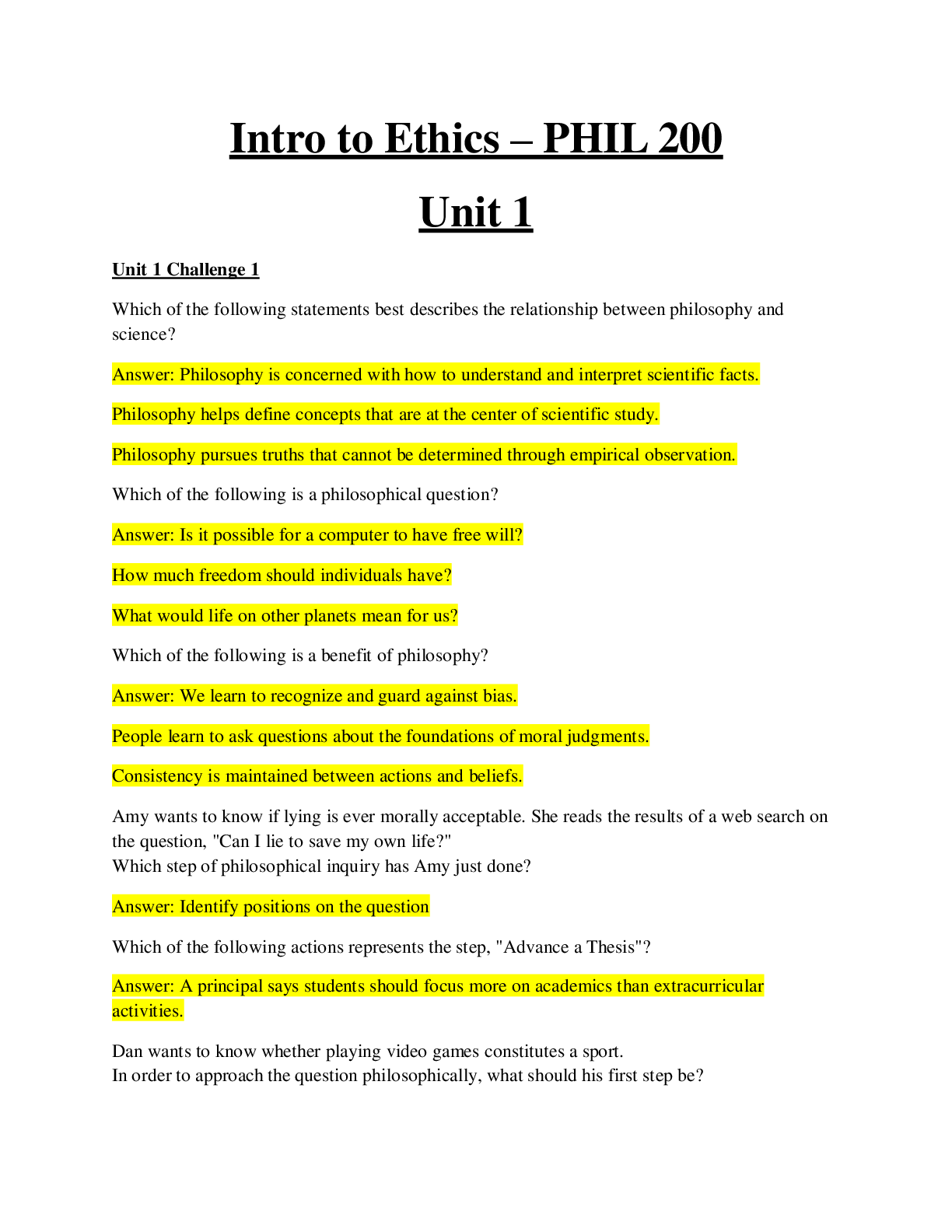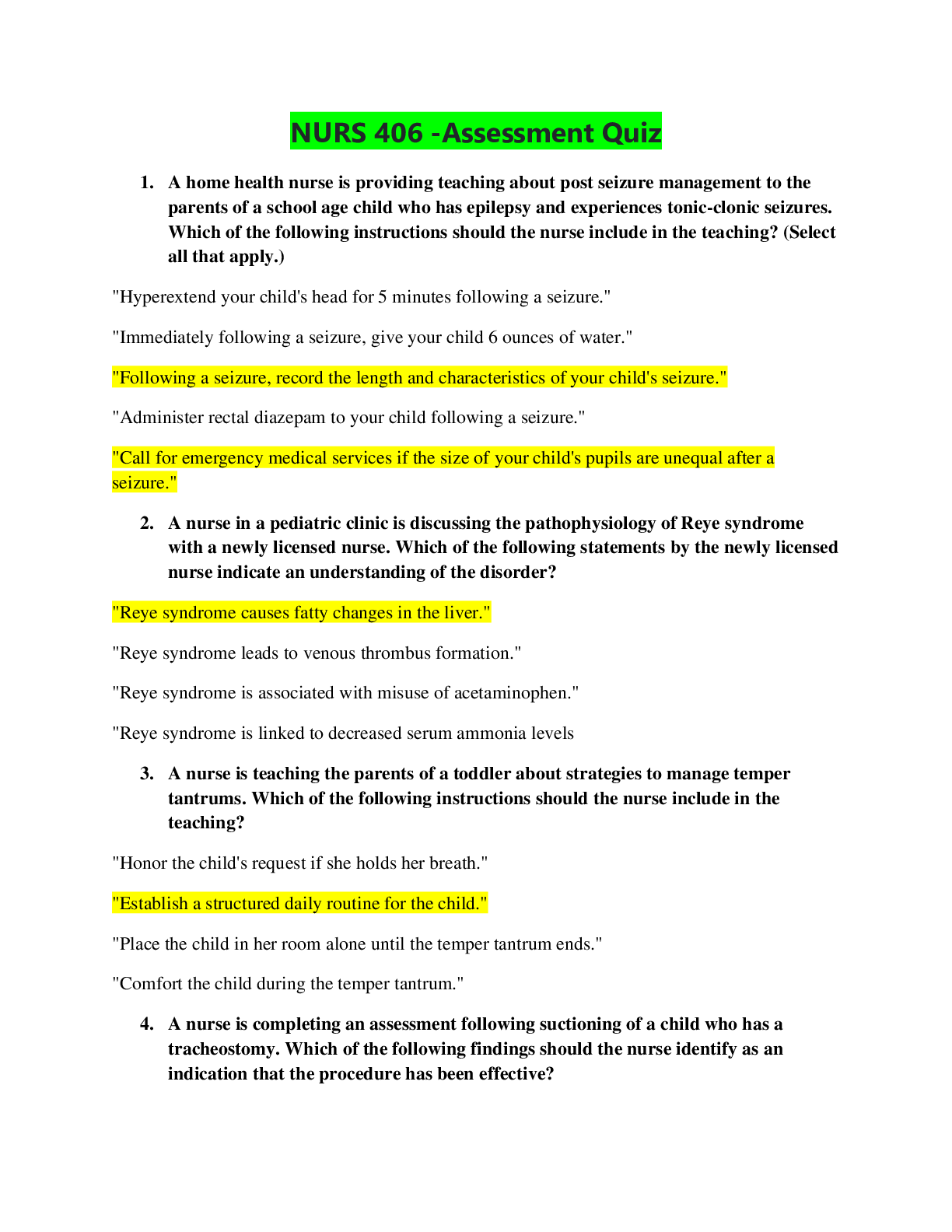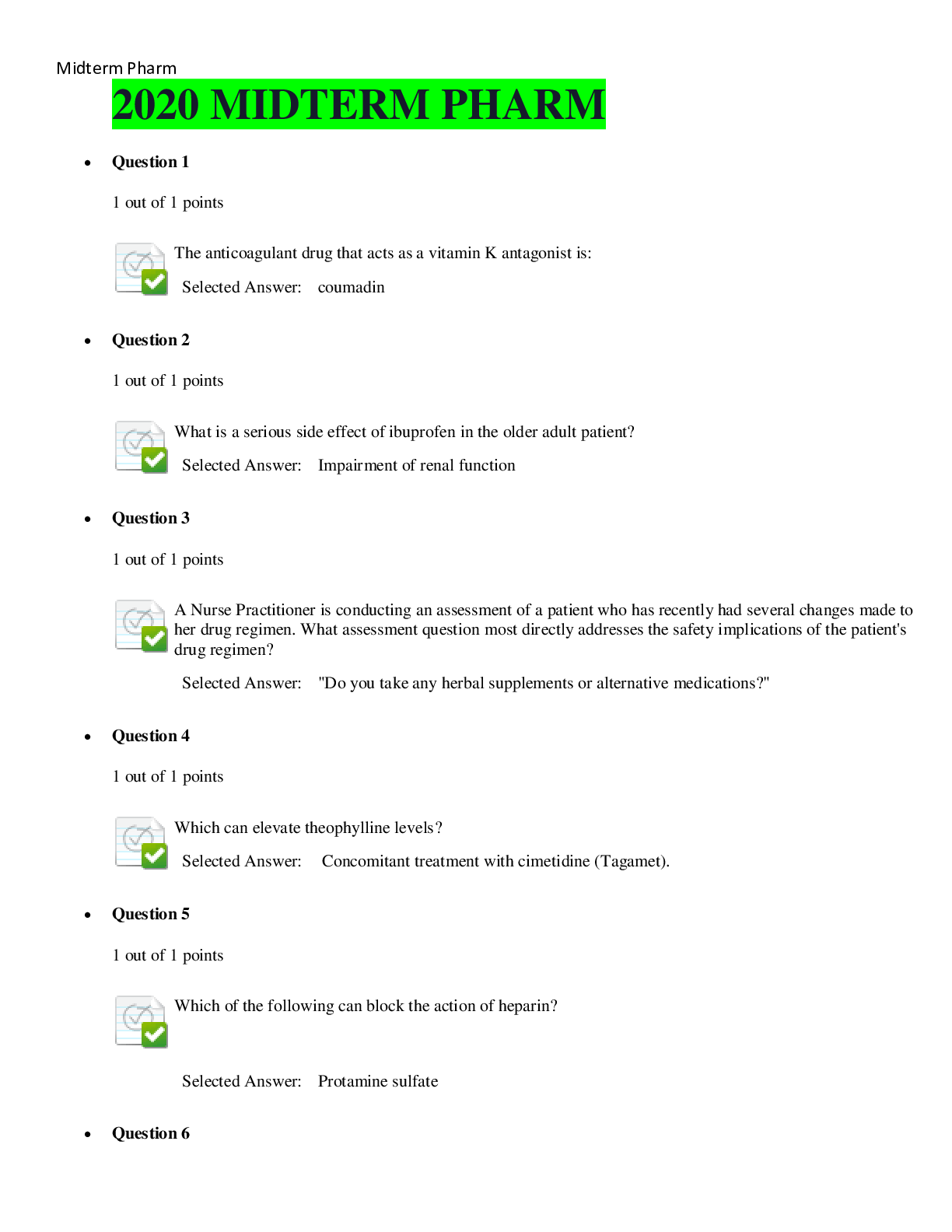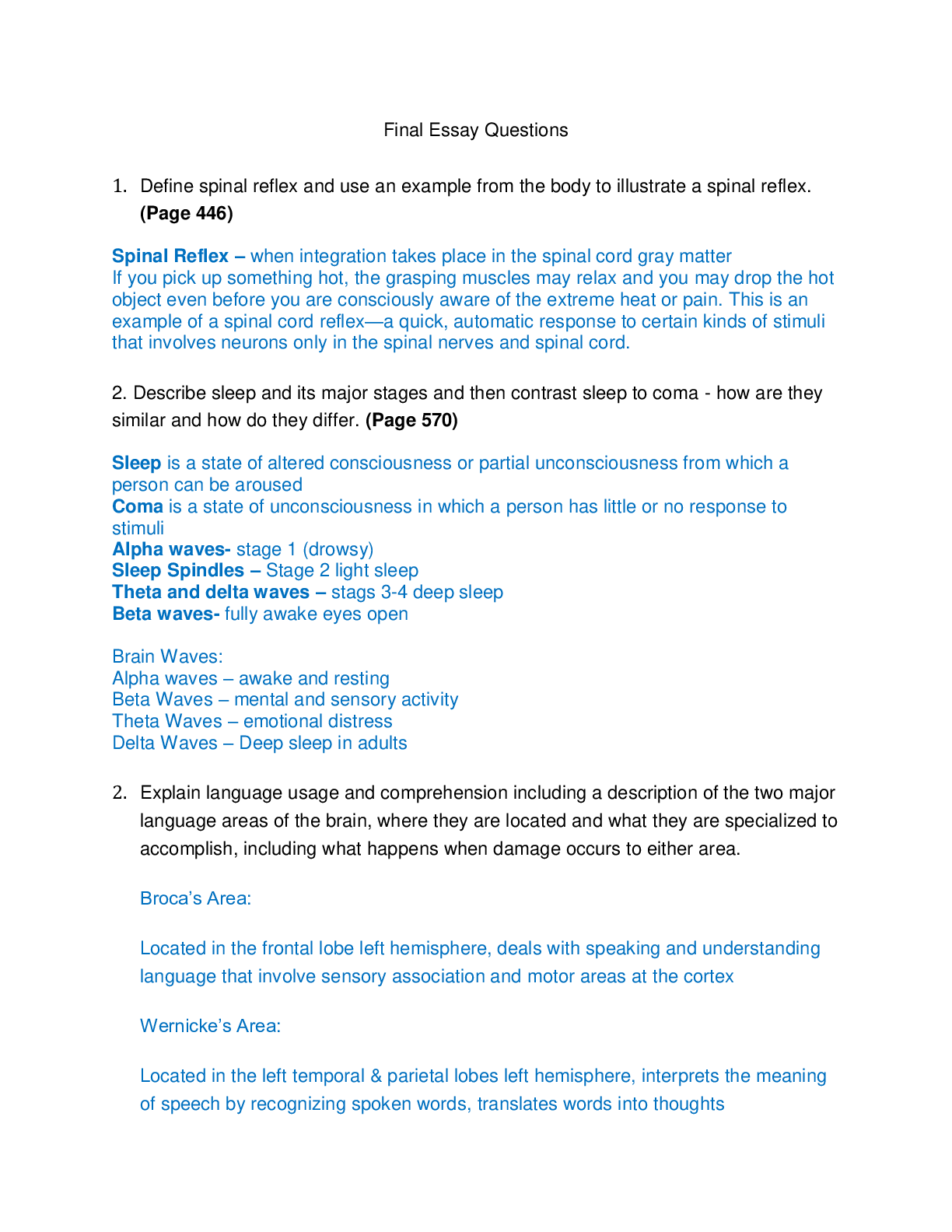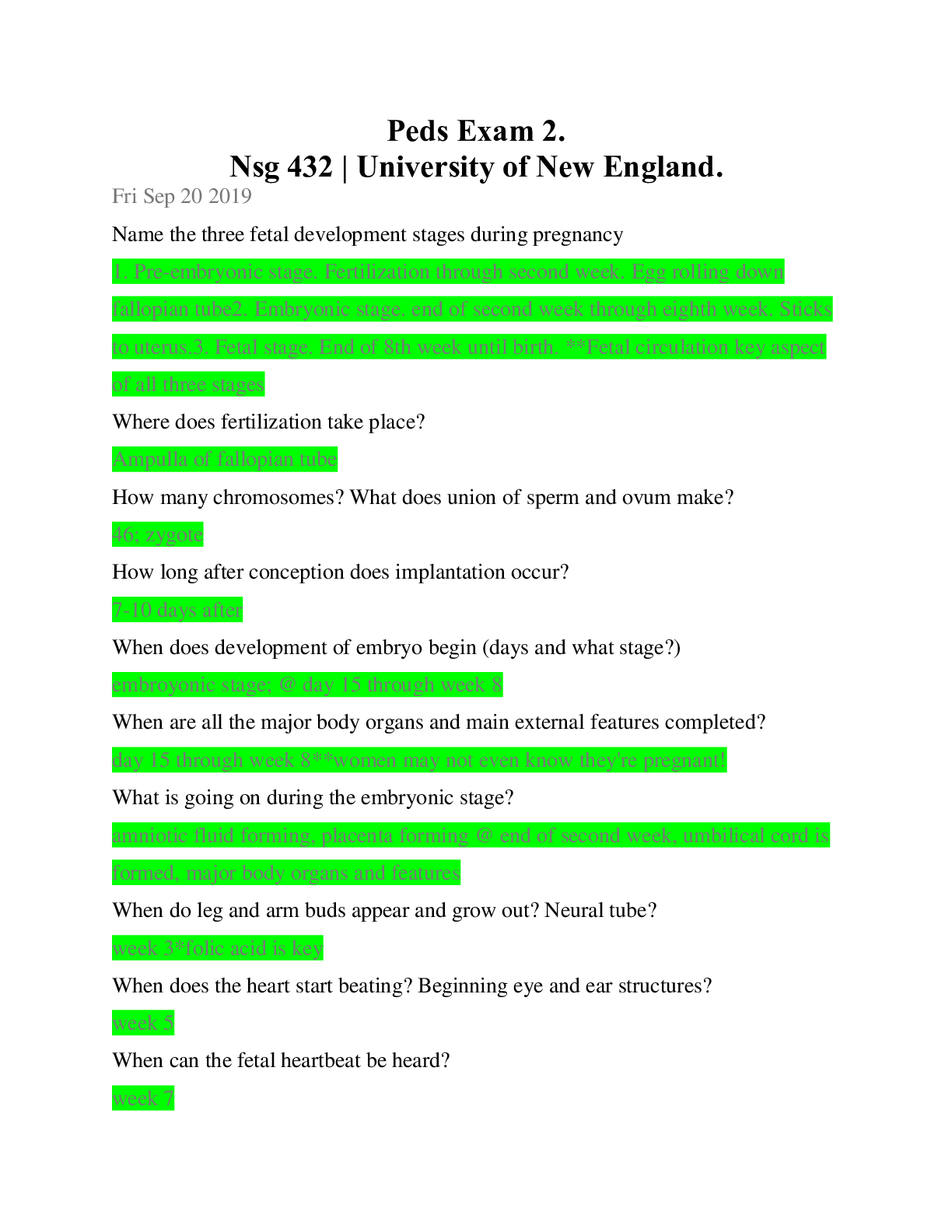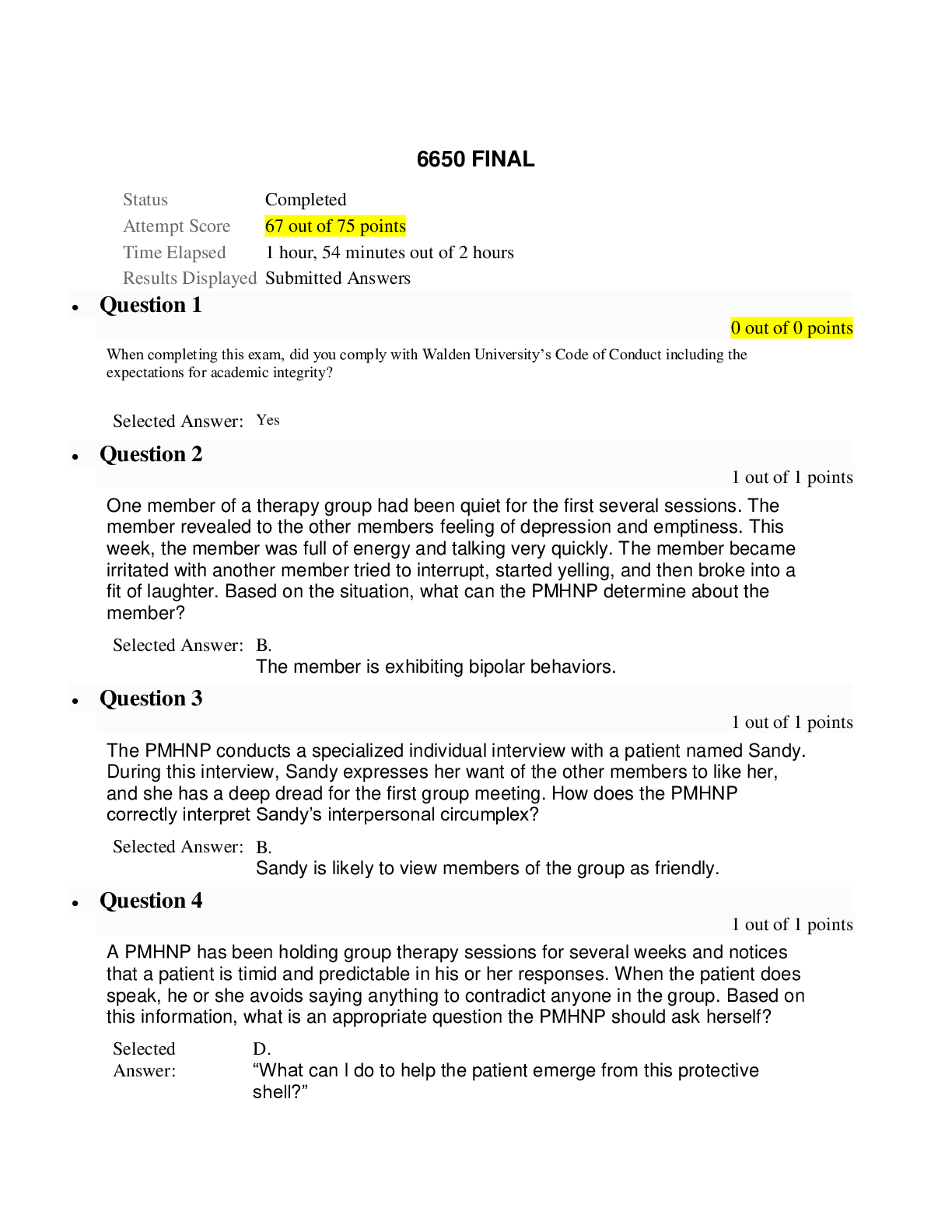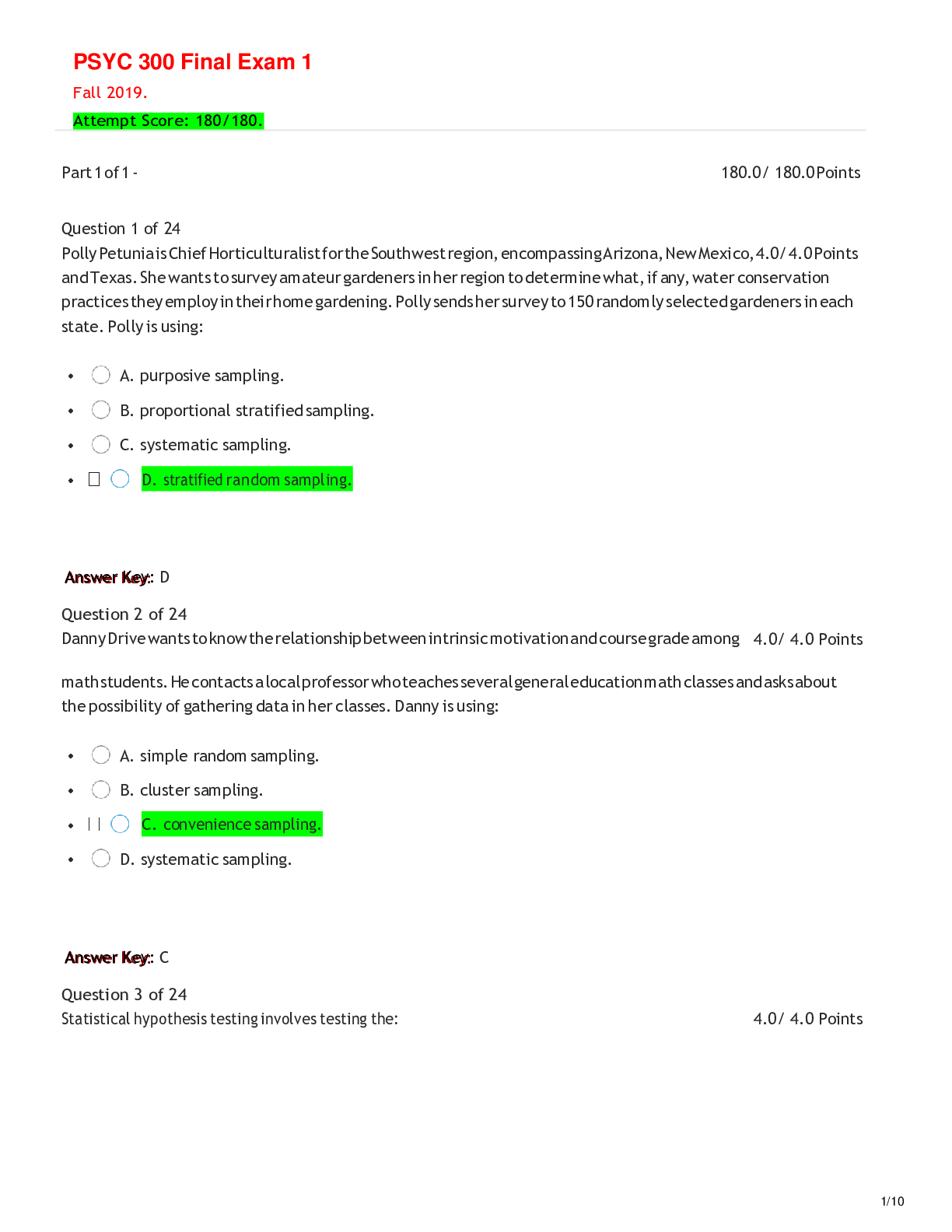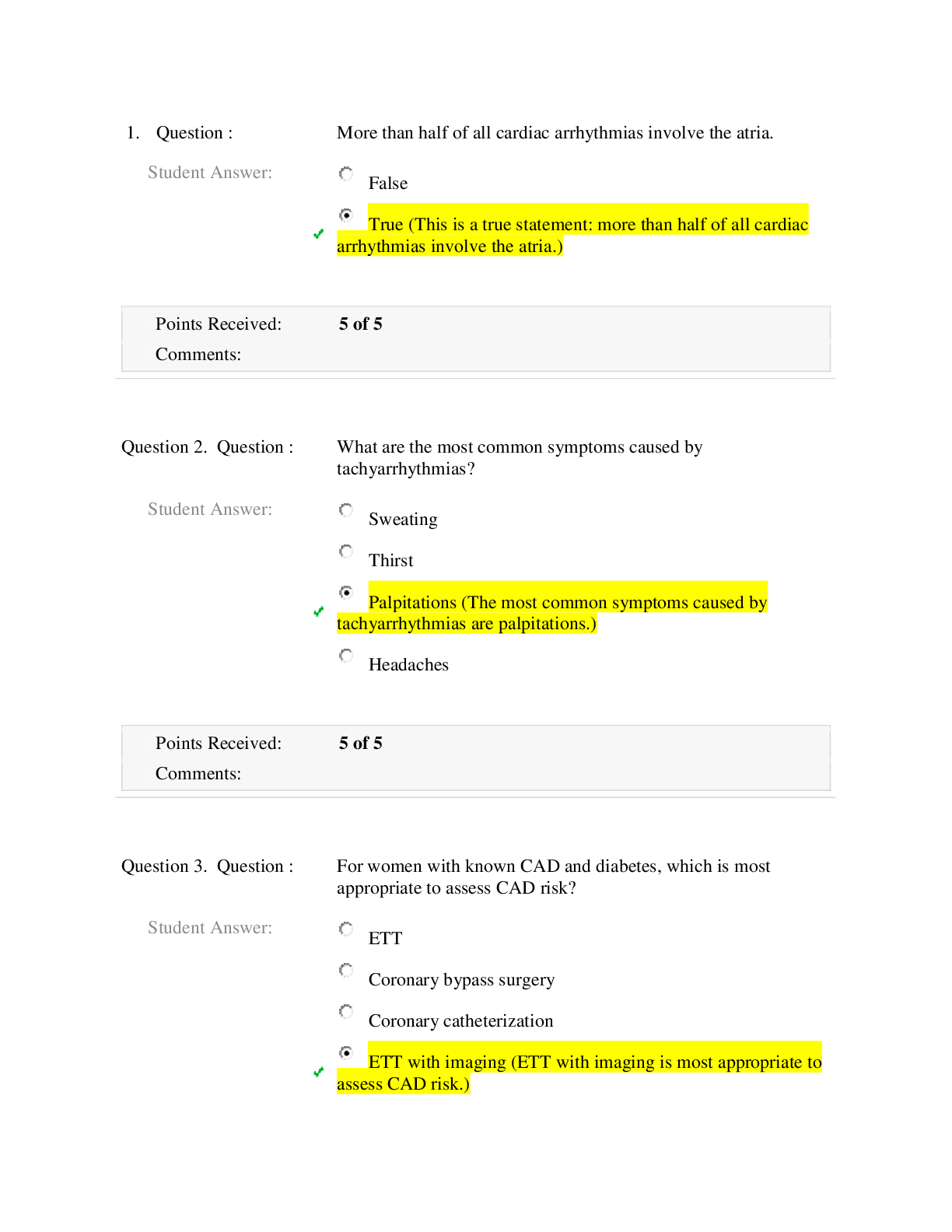BUSI 352 FINAL EXAM 1 - 100% CORRECT QUESTIONS AND ANSWERS
Document Content and Description Below
BUSI 352 FINAL EXAM 1 • Question 1 2 out of 2 points Which of the following does NOT play a part in a financial planner’s recommendations? • Question 2 2 out of 2 points Two of ... the more important factors affecting retirement planning are the savings amount and the growth of GDP. • Question 3 2 out of 2 points All of the following economic activities represent governmental fiscal policy EXCEPT: • Question 4 2 out of 2 points Which of the following statements regarding retirement trends is correct? • Question 5 2 out of 2 points Which of the following is a good benchmark for savings for retirement as a percent of gross income for someone who is between age 25 and 30? • Question 6 2 out of 2 points A letter of intent may include all the following except: • Question 7 2 out of 2 points Beth saves $2,500 a year from age 25 until age 34 (inclusive) and invests the money in an account earning ten percent annually. Beth stops investing at age 34, but does not withdraw the accumulation until age 65. In contrast, Bill saves $2,500 a year from age 35 until age 65 inclusively and invests in a similar account to Beth, earning ten percent annually. Because Bill saved significantly more than Beth, he will have accumulated significantly more than her at age 65. • Question 8 2 out of 2 points What is the most common range for the Wage Replacement Ratio (WRR)? • Question 9 2 out of 2 points Janet, a 35-year-old client who earns $45,000 a year, pays 7.65% of her gross pay in Social Security payroll taxes, and saves 8% of her annual gross income. Assume that Janet wants to maintain her exact pre-retirement lifestyle. Calculate Janet’s wage replacement ratio using the top-down approach (round to the nearest %) and using pre-tax dollars. • Question 10 2 out of 2 points Today, there are many non-traditional households. Which of the following statements are correct? 1- The non-traditional family may take many different forms. 2- DOMA defines what a marriage is for federal law, which may impact benefits and restrictions under the Internal Revenue Code. 3- There are very few differences that have to be dealt with in a non-traditional household. • Question 11 2 out of 2 points Tricia, a new client for Stephan, a CFP® professional, has asked for Stephan’s help with her financial planning. Specifically, she wants a complete analysis of her retirement situation including retirement projections, and wants Stephan to evaluate how much and what type of investments she should purchase. Which of the following is correct according to the Practice Standards? Question 12 2 out of 2 points If properly structured, a third party special needs trust’s assets are not counted or considered for the purposes of available benefits for the beneficiary when he or she is being considereed for possible federal, state, and local funds. Selected Answer: True • Question 13 2 out of 2 points Bill is 63, very wealthy and has one child from his current marriage with Hillary. He also has a child from a previous relationship that Hillary is unaware of. Bill’s investment portfolio and pension assets are held in a variety of accounts for which no overall plan has been developed. Bill, being kind and generous, has asked Monica, a CFP® professional, to assist him in maximizing his children’s inheritance while ensuring that Hillary is financially comfortable for the remainder of her life. All of the following items are relevant to determining if this engagement constitutes financial planning or material elements of the financial planning process EXCEPT: • Question 14 2 out of 2 points Trusts can be very beneficial in many financial planning situations. Many trust benefits, such as asset protection and control, are appropriate considerations for a family with a special needs person. Which of the following trusts would generally be used by a parent or grandparent to provide for needs, such as medical treatments, education or travel for a special needs child? • Question 15 2 out of 2 points For many years, Samuel has been employed as a financial advisor at a leading brokerage firm where he conducts suitability reviews and makes investment recommendations for his clients. He recently obtained his CFP® designation and has just signed an agreement with Thomas, a new client, for a comprehensive financial plan. According to the Code of Ethics, all of the following represent additional requirements for Samuel in his engagement with Thomas compared with his other clients EXCEPT: • Question 16 2 out of 2 points Which of the following is not an example of a special needs situation? • Question 17 2 out of 2 points A supermarket puts bacon on sale, which increases the demand for eggs. What are the two products? • Question 18 2 out of 2 points One of the challenges in retirement planning is that people are living longer and have been retiring early over the last 20 years with only a recent reversal in retirement age. • Question 19 2 out of 2 points Martin began saving $5,000 per year from age 25 to age 35 (ten years) and then invested the funds for another 30 years. Bob began saving at age 35 and saved $5,000 each year until he retired at age 65 (30 years). At what rate of return will Martin and Bob have the exact same balance at age 65? • Question 20 0 out of 2 points Bob has just retired with an investment portfolio equal to $1 million. He plans on using the 4% capital balance approach to retirement distributions. He also plans on distributing the amount in one lump sum at the beginning of the year. His first year, he distributes $40,000 to live on, in addition to his other income. However, the market takes a significant decline and his portfolio loses 40%. His second year, after he takes his distribution, his portfolio increases by 20%. How much can he take out in the third year if he is sticking with the 4% method? Round to the nearest thousand. • Question 21 2 out of 2 points Which of the following are special circumstances outside a nornmal financial planning engagement? • Question 22 2 out of 2 points Which of the following must be included, in writing, and any engagement letter that involves financial planning? • Question 23 2 out of 2 points According to the CFP Code of Ethics, what principle is being displayed in the following scenario: Tina is a prospctive client who recently approached Frank, a CFP® professional, with significant estate planning needs. Frank does not feel like he can adequately fulfill all of Jill’s needs so he refers Jill to a colleague who specializes in estate planning. • Question 24 2 out of 2 points Which of the following statements is false? • Question 25 2 out of 2 points Which, if any, of the following is not a principle from the Board of Standards Code of Ethics and Professional Responsibility? 1- Integrity. 2- Diligence. 3- Professionalism. 4- Candidness. • Question 26 2 out of 2 points A CFP® designee may disclose a client’s personal identifiable information without the specific consent of the client if: 1- It is in response to proper legal process. 2- It is to defend against charges of wrongdoing by the CFP® designee. 3- It is in connection with a civil dispute between the CFP® designee and the client. 4- It is in response to a request from the Internal Revenue Service. • Question 27 2 out of 2 points Beth just read that 40 years ago, milk was about $1.15 per gallon and today it is about $6 per gallon. She thought that seemed very high, especially if she can only earn 7% from her investments. She also thought that she would need about $3 million for retirement in today’s dollars. If inflation is the same in the future as it has been over the last 40 years for a gallon of milk, how much will she need to have accumulated when she retires in 30 years? • Question 28 0 out of 2 points The supply of coffee has been drastically reduced due to drought resulting in substantially higher prices. Which of the following statements is/are correct? 1- The demand curve for coffee will shift to the right. 2- The demand curve for creamer will shift to the left. 3- The demand for orange juice will increase. • Question 29 2 out of 2 points Winning the lottery is hard, but managing and preserving the assets after winning is relatively easy and history shows that most lottery winners make a successful transition to being wealthy that lasts for a long time. • Question 30 2 out of 2 points Ralph, a CFP® professional, has been working with his new client Jack over the last few months. He has completed all required disclosures and provided all written documents required for a financial planning engagement. Jack is 32, married, and has 3 children. Ralph discussed Jack’s insurance coverage following a thorough review of Jack’s policies and recommended Jack purchase a disability policy, additional term life insurance through his employer and a personal liability umbrella policy. Ralph also performed a retirement needs analysis and developed an investment plan he believes will help Jack achieve his goals. While presenting the retirement and investment plan, Jack mentioned that he was rejected for the life insurance for medical reasons that he does not wish to discuss with Ralph. To comply with the Practice Standards of the Code of Ethics, Ralph’s best course of action would be to: • Question 31 2 out of 2 points Which of the following is/are not a principle of the Board of Standards Code of Ethics and Professional Responsibility? 1- Integrity. 2- Disclosure. 3- Objectivity. 4- Competence. • Question 32 2 out of 2 points Which of the following statements is correct regarding Social Security? • Question 33 2 out of 2 points Thomas, a CFP® professional, has been Shelley’s financial advisor for over 20 years and is very familiar with her family situation, goals, objectives and needs. Thomas has just completed a meeting with Shelley and Gertrude, Shelley’s mother, who is 79. During the meeting, Thomas entered into an oral agreement with Shelley to manage Gertrude’s financial affairs. Gertrude offered no objections to this arrangement. Thomas did not complete a client profile for Gertrude since he was already fully aware of the family's and Gertrude’s situation. Gertrude collects a small amount from social security but must supplement that with the interest from her investment portfolio of $100,000. She indicated she would like to provide for her remaining life and establish education funds to send her six grandchildren to college. The grandchildren range in age from 2 - 15. According to the provisions of the Practice Standards, Thomas should take all of the following actions before initiating any action on behalf of Gertrude, EXCEPT: • Question 34 2 out of 2 points Mary is a CFP® professional and is in the analyzing and evaluating step of the financial planning process. Mary is developing a capital needs analysis for her client and has established assumptions for tax rates, investment returns and inflation rates. Her client disagrees with Mary’s assumptions regarding inflation and other economic variables used in the retirement needs analysis calculation. What should Mary do next? • Question 35 2 out of 2 points Families with special needs children have more complicated lives than traditional families. Which of the following is correct? • Question 36 2 out of 2 points Steven, age 43, earns $80,000 annually; and his wage replacement ratio has been determined to be 80%. He expects inflation will average 3% for his entire life expectancy. He expects to work until 68, and live until 90. He anticipates an 8% return on his investments. Additionally, Social Security Administration has notified him that his annual retirement benefit, in today’s dollars will be $26,000. Using the capital preservation model, calculate how much capital Steven needs, in order to retire at 68. • Question 37 2 out of 2 points Which of the following are NOT client responsibilities during the financial planning process? 1- To pay their fees. 2- To provide the professional with all requested information. 3- To interpret all the information that is gathered. 4- To implement the financial plan. • Question 38 2 out of 2 points Barbara and John are near retirement. They have a joint life expectancy of 25 years in retirement. Barbara anticipates their annual income in retirement will need to increase each year at the rate of inflation, which they assume is 4%. Based on the assumption that their first year retirement need, beginning on the first day of retirement, for annual income will be $85,000, of which they have $37,500 available from other sources, and an annual after-tax rate of return of 6.5%, calculate the total amount that needs to be in place when John and Barbara begin their retirement. • Question 39 2 out of 2 points John is a CFP® professional and is engaged in the financial planning process with his client Frank. John is in the data gathering process and has collected bank statements, insurance policies, estate documents, and all other relevant information with the exception of tax returns. Frank refuses to supply the tax returns or any documents that support his income claims. John’s best course of action is to? • Question 40 0 out of 2 points Which of the following debts are dischargeable in bankruptcy? • Question 41 2 out of 2 points What should Tim, the CFP® professional do in this scenario: Client Bill seems to be suffering from dementia and wants to remove his children from his will and give all his wealth to Marsha, a neighbor who periodically visits Bill and delivers him groceries. • Question 42 0 out of 2 points Which of the following statements concerning supply and / or demand is / are correct? 1- If demand increases and supply simultaneously decreases, equilibrium price will rise. 2- There is an inverse relationship between price and quantity demanded. 3- If demand decreases and supply simultaneously increases, equilibrium price will fall. 4- If demand decreases and supply remains constant, equilibrium price will rise. • Question 43 0 out of 2 points John, age 58, has been using a CFP® practitioner for the last 15 years. The CFP® practitioner recently retired and, as a result, John has decided to engage Tom, who is also a CFP® practitioner, but unaffiliated with John’s original practitioner. After analyzing and evaluating John’s current financial position, Tom made his recommendations. Those recommendations differed from that of John’s original practitioner. According to Practice Standard 400-2, how should the differing recommendations be handled? • Question 44 2 out of 2 points Reed just found out that his dad, Red, has terminal cancer. Terminal illness can be devastating for a family. The financial planner working with Red will likely have to deal with which of the following? 1- Estate documents. 2- Beneficiary designation forms. 3- Emotional issues. • Question 45 2 out of 2 points Providing a good home and maintaining a family is challenging enough without a special needs dependent. However, it becomes much more complicated with a child who is disabled or who has special needs. Which of the following is not correct? • Question 46 0 out of 2 points Which, if any, of the following statements is (are) correct? 1- The average income or standard of living is a key determinant of demand. 2- Downward sloping demand indicates that if the price is decreased, demand will increase. • Question 47 2 out of 2 points Jonathan got divorced in 2007 and subsequently had severe financial problems. In 2009, he filed for bankruptcy. After getting back on his feet, he graduated from college and got a job selling life insurance for a large national insurer. In July 2012, he completed all of the requirements for the CFP® designation. In August of 2012, he made his application to the CFP Board for licensing. Which of the following is correct under the Board's revised policy regarding bankruptcy? • Question 48 2 out of 2 points Which of the following is not one of the four stages of a business cycle? Question 49 2 out of 2 points During the years from 2000 to 2009, the average percentage of young adults who were married was between 65% and 80% and has been slightly increasing over time. • Question 50 0 out of 2 points Trusts can be very beneficial in many financial planning situations. Many trust benefits, such as asset protection and control, are appropriate considerations for a family with a special needs person. Which of the following types of trusts would generally be used to protect a judgement from a lawsuit, on behalf of a special needs child? • Question 51 2 out of 2 points When dealing with a client who is terminally ill, it is important to consider viatical settlement options and accelerated benefit provisions in life insurance policies. • Question 52 2 out of 2 points The CFP Board is a certification and standard-setting organization that: • Question 53 2 out of 2 points While equities have historically outperformed other asset classes, they have not done so after considering inflation and taxes. • Question 54 2 out of 2 points A savings rate of 5% of income should be sufficient for most people planning on retirement, especially considering the average savings rate is significantly less. • Question 55 2 out of 2 points In a bankruptcy proceeding, all of the following claims will be discharged except: • Question 56 0 out of 2 points Steven, age 43, earns $80,000 annually; and his wage replacement ratio has been determined to be 80%. He expects inflation will average 3% for his entire life expectancy. He expects to work until 68, and live until 90. He anticipates an 8% return on his investments. Additionally, Social Security Administration has notified him that his annual retirement benefit, in today’s dollars will be $26,000. Using the capital needs / annuity method, calculate how much capital Steven will need to be able to retire at age 68. • Question 57 2 out of 2 points Josh is a CFP® professional and recently met with his prospective client, Mary. Mary is the owner of a chain of retail toy stores throughout the Midwest. Mary was referred to Josh through a mutual friend. Mary is considering rolling out a new 401(k) plan to her employees and has asked Josh to review her current plan and make a recommendation on improving the plan. Which of the following is acquired to be provided to Mary according to the Code of Ethics? • Question 58 2 out of 2 points Paul recently applied for CFP® Certification. Which of the following would always bar him from certification? • Question 59 2 out of 2 points Which type of bankruptcy filing allows an individual to keep their assets and pay off a portion of their debt over time? • Question 60 2 out of 2 points Divorce is a very emotional time for those who are going through it and assistance from a financial advisor is generally helpful. Which of the following are common mistakes that are made by those going through divorce? • Question 61 2 out of 2 points Which of the following is not a consumer protection law? • Question 62 2 out of 2 points CFP® designee agrees to be bound by Continuing Education (CE) Requirements established by Certified Financial Planner Board of Standards. The CE Requirements for a regular continuing designee (not a new designee or a designee who has been inactive) are as follows: Question 63 2 out of 2 points Which of the following comes under an exemption from registration status of the Investment Advisers Act of 1940? • Question 64 2 out of 2 points One of the most important considerations for a child with special needs is to preserve governmental benefits. • Question 65 2 out of 2 points Which of the following convictions, if any, will always bar a candidate from becoming a CFP® professional? 1- Conviction for tax fraud. 2- Conviction for passing a bad check. • Question 66 2 out of 2 points Under the Candidate Fitness Standards, the following conduct is unacceptable and will always bar an individual from becoming certified. 1- Felony conviction for any degree of murder or rape 2- Felony conviction for any other violent crime within the last five years 3- Two or more personal or business bankruptcies • Question 67 2 out of 2 points Considering employment and production, which two of the following industries are typically more affected by recession? 1- Capital goods. 2- Consumer durable goods. 3- Consumer non-durable goods. 4- Services. • Question 68 2 out of 2 points The Dodd - Frank Wall Street Reform and Consumer Protection Act permanently increased the FDIC limit to what amount? • Question 69 2 out of 2 points It typically takes six months to find a new job, regardless of the industry or specific job of a person. • Question 70 0 out of 2 points Today, Walter is submitting his Initial Application for CFP® certification with the CFP Board of Standards. Four years earlier, Walter signed a Letter of Acceptance, Waiver and Consent with FINRA, as part of FINRA arbitration hearing. As part of the arbitration settlement, Walter consented to a 30-day suspension, a fine of $100,000 and 20 hours of continuing education. Which action is most appropriate for Walter to take when completing his Initial Application for CFP® Certification? • Question 71 2 out of 2 points Because income from fixed income assets is taxed at a higher income tax rate than capital gains and dividends from equities, there is no reason that one would have fixed income assets in a taxable account over a tax deferred account. • Question 72 2 out of 2 points Which of the following statements is generally true? • Question 73 0 out of 2 points You receive a phone call from an individual you have NOT spoken with previously. The caller is excited, just having heard that a new mutual fund is positioned to deliver large gains in the coming year. The caller wishes to purchase shares of the fund through you. According to the Code of Ethics, which of the following would be acceptable actions for a CFP® professional? • Question 74 2 out of 2 points David, age 52, has come to you for help in planning his retirement. He works for a bank, where he earns $60,000. David would like to retire at age 62. He has consistently earned 8% on his investments and inflation has averaged 3%. Assuming he is expected to live until age 95 and he has a wage replacement ratio of 80%, how much more will David need at retirement to have the same amount at his death with an equal purchasing power as he will have at his retirement? • Question 75 2 out of 2 points Beth and Scott have been married for 15 years but are now getting divorced. They were married young and have one child, who is age 9. This is a very emotional time for both of them. If you were their advisor, which of the following would you recommend? Question 51 0 out of 2 points John, age 58, has been using a CFP® practitioner for the last 15 years. The CFP® practitioner recently retired and, as a result, John has decided to engage Tom, who is also a CFP® practitioner, but unaffiliated with John’s original practitioner. After analyzing and evaluating John’s current financial position, Tom made his recommendations. Those recommendations differed from that of John’s original practitioner. According to Practice Standard 400-2, how should the differing recommendations be handled? John, age 58, has been using a CFP® practitioner for the last 15 years. The CFP® practitioner recently retired and, as a result, John has decided to engage Tom, who is also a CFP® practitioner, but unaffiliated with John’s original practitioner. After analyzing and evaluating John’s current financial position, Tom made his recommendations. Those recommendations differed from that of John’s original practitioner. According to Practice Standard 400-2, how should the differing recommendations be handled? • Question 1 2 out of 2 points Rick would like to retire in 11 years at the age of 66. He would like to have sufficient retirement assets to allow him to withdraw 90% of his current income, less Social Security, at the beginning of each year. He expects to receive $24,000 per year from Social Security in today’s dollars. Rick is conservative and assumes that he will only earn 9% on his investments, that inflation will be 4% per year and that he will live to be 106 years old. If Rick currently earns $150,000, how much does he need at retirement? • Question 2 2 out of 2 points Janet, a 35-year-old client who earns $45,000 a year, pays 7.65% of her gross pay in Social Security payroll taxes, and saves 8% of her annual gross income. Assume that Janet wants to maintain her exact pre-retirement lifestyle. Calculate Janet’s wage replacement ratio using the top-down approach (round to the nearest %) and using pre-tax dollars. • Question 3 2 out of 2 points Which of the following are special circumstances outside a nornmal financial planning engagement? • Question 4 0 out of 2 points Which of the following is/are true regarding revocation? 1- Revocation is permanent. 2- A CFP® designee may petition CFP Board for reinstatement after revocation if the designee proves that he or she has been rehabilitated by clear and convincing evidence. 3- Revocation is not always permanent. • Question 5 2 out of 2 points The WLE and the RLE expectancy are not inversely related. • Question 6 2 out of 2 points Saben is 40 and wants to retire in 20 years. His family has a history of living well into their 90s. Therefore, he would like to plan on living until age 100, just in case. He currently needs $100,000 and expects that he will need about 80% of that if he were retired. He can earn 9 percent in his portfolio and expects inflation to be 3 percent annually. Some years ago, he purchased an annuity that is expected to pay him $30,000 per year beginning at age 60. It includes an inflation rate cost of living adjustment. In addition, he received $500,000 from his uncle BJ when he died. Saben has spent $200,000 on his home, but is investing $300,000 for his retirement. His Social Security benefit in today’s dollars is $20,000. Which of the following statements is true? Selected Answer: Saben’s current savings and other sources of income are adequate to satisfy his retirement needs. • Question 7 0 out of 2 points Bob is a CFP® professional and has entered into a signed engagement letter to provide the first four steps of the financial planning process. Once Bob has made the recommendations, the engagement letter clearly identifies that the scope of the relationship ends and the client is solely responsible for implementation. Six months after Bob provided a client with his recommendations, the client approached Bob about purchasing life insurance through Bob, which was one of the recommendations in his plan. Is Bob still engaged with the client? Selected Answer: No, the engagement letter limited the scope of the services to be provided. Bob is no longer engaged in the financial planning process with the client. Bob is now selling product beyond the scope of the engagement. • Question 8 2 out of 2 points A letter of intent may include all the following except: Selected Answer: Requirements of future caregiver • Question 9 2 out of 2 points Which of the following is/are not a principle of the Board of Standards Code of Ethics and Professional Responsibility? 1- Integrity. 2- Disclosure. 3- Objectivity. 4- Competence. Selected Answer: 1 and 4. • Question 10 2 out of 2 points According to the MetLife Center for Special Planning Needs, approximately 4% of families are raising a child or children with a disability. Selected Answer: True • Question 11 2 out of 2 points John has just retired with an investment portfolio equal to $1 million. He plans on using the 4% capital balance approach to retirement distributions. He also plans on distributing the amount in one lump sum at the beginning of the year. His first year, he distributes $40,000 to live on, in addition to his other income. However, the market takes a significant decline and his portfolio loses 20%. His second year, after he takes his distribution, his portfolio takes another decline of 20%. How much can he take in the third year if he is sticking with the 4% method? Round to the nearest thousand. Selected Answer: $24,000. • Question 12 0 out of 2 points Jonathan got divorced in 2007 and subsequently had severe financial problems. In 2009, he filed for bankruptcy. After getting back on his feet, he graduated from college and got a job selling life insurance for a large national insurer in 2011. During his first year on the job, he received a large number of customer complaints, his insurance license was suspended for one month and he was discharged by his employer. During his unemployment, he completed all of the requirements for the CFP® designation. In August of 2012, he made his application to the CFP Board. Which of the following is correct under the Board's revised policy regarding bankruptcy? Selected Answer: Jonathan’s bankruptcy will be disclosed on the CFP® professional’s public profile displayed on the CFP Board’s website for 10 years. He will need to request a consideration from the Disciplinary and Ethics Commission for the suspension, but the bankruptcy will not be a factor in their decision. • Question 13 2 out of 2 points Trusts are general tools that are beneficial in many financial planning situations. Many trust benefits, such as asset protection and control, are appropriate considerations for a family with a special needs person. Which of the following is generally correct regarding special needs trusts? Selected Answer: A special needs trust under 42 U.S.C. Sec. 1396p(d)(4)(A) will permit a family member to contribute to the trust for the benefit of the special needs child without adversely effecting government benefits if funds are paid back to the State to the extent of the benefit at the death of the child. • Question 14 2 out of 2 points One of every four families (25%) with a female head of household and no husband present reported members with a disability. Selected Answer: False • Question 15 2 out of 2 points Which of the following statements is false? Selected Answer: A sensitivity analysis helps the financial planner determine the single most effective factor in a retirement plan. • Question 16 2 out of 2 points Cindy and Sandy are a same sex couple who got married in Vermont. Their marriage entitles them to the same benefits under federal law as a heterosexual couple. Selected Answer: True • Question 17 2 out of 2 points The Dodd - Frank Wall Street Reform and Consumer Protection Act permanently increased the FDIC limit to what amount? Selected Answer: $250,000. • Question 18 2 out of 2 points Which of the following does NOT play a part in a financial planner’s recommendations? Selected Answer: Political affiliation • Question 19 2 out of 2 points Differentiating between separate, joint, community and inherited property is not that important when going through a divorce because the court will decide on the property settlement, based on the facts and circumstances. Selected Answer: False • Question 20 2 out of 2 points Barbara and John are near retirement. They have a joint life expectancy of 25 years in retirement. Barbara anticipates their annual income in retirement will need to increase each year at the rate of inflation, which they assume is 4%. Based on the assumption that their first year retirement need, beginning on the first day of retirement, for annual income will be $85,000, of which they have $37,500 available from other sources, and an annual after-tax rate of return of 6.5%, calculate the total amount that needs to be in place when John and Barbara begin their retirement. Selected Answer: $906,131.31 • Question 21 2 out of 2 points Trusts can be very beneficial in many financial planning situations. Many trust benefits, such as asset protection and control, are appropriate considerations for a family with a special needs person. Which of the following is true? Selected Answer: A special needs trust under 42 U.S.C. Sec. 1396p(d)(4)(A) will permit a family member to contribute to the trust for the benefit of the special needs child without adversely effecting government benefits if funds are paid back to the State to the extent of the benefit at the death of the child. • Question 22 2 out of 2 points You receive a phone call from an individual you have NOT spoken with previously. The caller is excited, just having heard that a new mutual fund is positioned to deliver large gains in the coming year. The caller wishes to purchase shares of the fund through you. According to the Code of Ethics, which of the following would be acceptable actions for a CFP® professional? Selected Answer: Gather sufficient information about the client to establish a brokerage account and execute the transaction after discussing your compensation, any potential conflicts of interest, contact information and any other material information about you and your firm. • Question 23 2 out of 2 points How many months of income is the recommended amount (in general) to be accumulated in an emergency fund? Selected Answer: 3-6 months • Question 24 2 out of 2 points Divorce is a very emotional time for those who are going through it and assistance from a financial advisor is generally helpful. Which of the following are common mistakes that are made by those going through divorce? Selected Answer: All of the above are common mistakes • Question 25 2 out of 2 points Considering employment and production, which two of the following industries are typically more affected by recession? 1- Capital goods. 2- Consumer durable goods. 3- Consumer non-durable goods. 4- Services. Selected Answer: 1 and 2. • Question 26 2 out of 2 points Elin wants to retire in 20 years when she turns 60. Elin wants to have enough money to replace 120% of her current income less what she expects to receive from Social Security. She expects to receive $20,000 per year from Social Security in today’s dollars. Elin is conservative and wants to assume a 6% annual investment rate of return and assumes that inflation will be 3% per year. Based on her family history, Elin expects that she will live to be 95 years old. If Elin currently earns $100,000 per year and expects her raises to equal the inflation rate, approximately how much does she need at retirement to fulfill her retirement goals? Selected Answer: $4,045,303. • Question 27 2 out of 2 points Which of the following is not an example of a special needs situation? Selected Answer: Planning for the Charles family with three boys ages 2, 3 and 4. • Question 28 2 out of 2 points Ruby, a CFP® professional works for a life insurance company and sells only life insurance products. She met with her new client Sally, a single parent, for the first time today. She had already collected data from Sally concerning her income, needs and age of her children. During the meeting, Ruby discussed the distinctions between term, universal and variable life insurance with Sally. She subsequently evaluated Sally's needs concerning life insurance and plans to discuss the advantages and disadvantages of two approaches: (1) purchasing a universal policy designed to provide sufficient coverage for Sally’s insurance needs while building cash value for the long term, and (2) purchasing a term policy to cover insurance needs until her children become independent and recommending another CFP® professional who Ruby is confident could assist Sally with building her investment portfolio for the long term. Which of the following would be correct under the CFP Board’s Practice Standards? Selected Answer: Ruby is not engaged in financial planning if Sally chooses option (1) because she is limiting her engagement to only one financial planning subject area. • Question 29 2 out of 2 points Steven, age 43, earns $80,000 annually; and his wage replacement ratio has been determined to be 80%. He expects inflation will average 3% for his entire life expectancy. He expects to work until 68, and live until 90. He anticipates an 8% return on his investments. Additionally, Social Security Administration has notified him that his annual retirement benefit, in today’s dollars will be $26,000. Using the capital needs / annuity method, calculate how much capital Steven will need to be able to retire at age 68. Selected Answer: $1,112,863.56. • Question 30 2 out of 2 points Under the Disciplinary Rules, which of the following is not a form of discipline? Selected Answer: A monetary fine • Question 31 2 out of 2 points Which of the following is not an example of a special needs situation? Selected Answer: Planning for the Smith family with three boys ages 2, 3 and 4 • Question 32 0 out of 2 points Trusts can be very beneficial in many financial planning situations. Many trust benefits, such as asset protection and control, are appropriate considerations for a family with a special needs person. Which of the following types of trusts would generally be used to protect a judgement from a lawsuit, on behalf of a special needs child? Selected Answer: Family trust or third party trust. • Question 33 2 out of 2 points During the years from 2000 to 2009, the average percentage of young adults who were married was between 65% and 80% and has been slightly increasing over time. Selected Answer: False • Question 34 2 out of 2 points Which of the following debts are dischargeable in bankruptcy? Selected Answer: Parking tickets. • Question 35 2 out of 2 points Which of the following is not correct regarding the Federal Reserve? Selected Answer: The Bank Borrowing Rate is the overnight lending rate between member banks. • Question 36 2 out of 2 points When the economy experiences a decline in real GDP for two or more successive quarters, what stage of the economic cycle does this indicate? Selected Answer: Recession. • Question 37 0 out of 2 points Under the Candidate Fitness Standards, the following conduct is unacceptable and will always bar an individual from becoming certified. 1- Felony conviction for any degree of murder or rape 2- Felony conviction for any other violent crime within the last five years 3- Two or more personal or business bankruptcies Selected Answer: 3 only • Question 38 0 out of 2 points Gross Domestic Product (GDP) represents the net output of a country by its citizens and foreigners in the country over a specific period of time. Selected Answer: [None Given] • Question 39 2 out of 2 points What should Tim, the CFP® professional do in this scenario: Client Bill seems to be suffering from dementia and wants to remove his children from his will and give all his wealth to Marsha, a neighbor who periodically visits Bill and delivers him groceries. Selected Answer: Tim should contact Bill’s lawyer. • Question 40 2 out of 2 points When investors are young, their investment portfolio should typically be dominated by common stocks because, due to long time horizons, young investors can generally afford the additional risk of common stocks. As investors near retirement, their asset allocation should rapidly shift to all fixed income securities to provide for income and to mitigate against the risk of the equity markets. Selected Answer: False • Question 41 2 out of 2 points Inflation refers to: Selected Answer: Rising prices. • Question 42 2 out of 2 points Which of the following are NOT client responsibilities during the financial planning process? 1- To pay their fees. 2- To provide the professional with all requested information. 3- To interpret all the information that is gathered. 4- To implement the financial plan. Selected Answer: 1,3,4 • Question 43 2 out of 2 points According to the CFP Code of Ethics, what principle is being displayed in the following scenario: Tina is a prospctive client who recently approached Frank, a CFP® professional, with significant estate planning needs. Frank does not feel like he can adequately fulfill all of Jill’s needs so he refers Jill to a colleague who specializes in estate planning. Selected Answer: Competence • Question 44 2 out of 2 points Martin began saving $5,000 per year from age 25 to age 35 (ten years) and then invested the funds for another 30 years. Bob began saving at age 35 and saved $5,000 each year until he retired at age 65 (30 years). At what rate of return will Martin and Bob have the exact same balance at age 65? Selected Answer: 6.28%. • Question 45 2 out of 2 points While equities have historically outperformed other asset classes, they have not done so after considering inflation and taxes. Selected Answer: False • Question 46 2 out of 2 points In a bankruptcy proceeding, all of the following claims will be discharged except: Selected Answer: Child support. • Question 47 2 out of 2 points John, age 58, has been using a CFP® practitioner for the last 15 years. The CFP® practitioner recently retired and, as a result, John has decided to engage Tom, who is also a CFP® practitioner, but unaffiliated with John’s original practitioner. After analyzing and evaluating John’s current financial position, Tom made his recommendations. Those recommendations differed from that of John’s original practitioner. According to Practice Standard 400-2, how should the differing recommendations be handled? Selected Answer: Significant differences in recommendations between planners are acceptable, as long as the recommendations reasonably meet the client’s goals, needs and priorities. • Question 48 2 out of 2 points Which of the following convictions, if any, will always bar a candidate from becoming a CFP® professional? 1- Conviction for tax fraud. 2- Conviction for passing a bad check. Selected Answer: 1 only. • Question 49 2 out of 2 points Which of the following statements concerning supply and/or demand is/are true? Selected Answer: If demand decreases and supply simultaneously increases, equilibrium price will fall. • Question 50 2 out of 2 points Retirement life expectancy (RLE) is the timeperiod beginning at retirement and extending until death. Selected Answer: True • Question 51 2 out of 2 points Ralph, a CFP® professional, has been working with his new client Jack over the last few months. He has completed all required disclosures and provided all written documents required for a financial planning engagement. Jack is 32, married, and has 3 children. Ralph discussed Jack’s insurance coverage following a thorough review of Jack’s policies and recommended Jack purchase a disability policy, additional term life insurance through his employer and a personal liability umbrella policy. Ralph also performed a retirement needs analysis and developed an investment plan he believes will help Jack achieve his goals. While presenting the retirement and investment plan, Jack mentioned that he was rejected for the life insurance for medical reasons that he does not wish to discuss with Ralph. To comply with the Practice Standards of the Code of Ethics, Ralph’s best course of action would be to: Selected Answer: Inform Jack that without more information on his medical condition Ralph will not be able to properly address his situation and he would have to restrict the scope of the engagement to the already completed insurance review. • Question 52 2 out of 2 points Which, if any, of the following statements is (are) correct? 1- Deflation is a decrease in the overall price levels of goods and services. 2- Disinflation is a slowdown in the rate of inflation. Selected Answer: Both 1 and 2. • Question 53 2 out of 2 points Which of the following statements regarding retirement trends is correct? Selected Answer: The spending pattern of most elderly retirees shows an average decline in outflow during the latter part of retirement. • Question 54 0 out of 2 points Dennis and Rhonda are married with two boys, Blake and Chase. They have the following accounts with the following balances at their local bank: Dennis (single account) - $300,000 Rhonda (single account) - $100,000 Dennis & Rhonda (joint account) - $400,000 Rhonda & Blake (joint account) - $100,000 How much of all of their accounts will be insured by the FDIC? Selected Answer: $900,000. • Question 55 2 out of 2 points Inflation is a genuine issue for retirement planning because a person age 65 will on average live between 18 and 20 years and the cost of goods can double over that period of time. Selected Answer: True • Question 56 2 out of 2 points The statement, “Harry is a very pleasant young man who is interested in politics and is generally skilled with woodworking equipment” might be found in what document? Selected Answer: A letter of intent. • Question 57 2 out of 2 points 1. During a period of recession/contraction, which of the following would be true? 1- Unemployment would be increasing. 2- The supply of goods and services would be decreasing. 3- Interest rates would be decreasing. 4- Inflation would be decreasing. Selected Answer: 1, 2, 3, and 4 • Question 58 2 out of 2 points According to the textbook, what percentage of lottery winners spent 100% of their winnings within 5 years? Selected Answer: 44% • Question 59 0 out of 2 points Jack is getting ready to retire. He has a salary of $100,000 and is saving 15% annually in his 401(k) plan and he just made his last principal and interest monthly payment on his mortgage of $2,350. His home is now debt free. What would you recommend regarding a wage replacement ratio, assuming he wants to maintain his lifestyle. Selected Answer: 85%. • Question 60 2 out of 2 points The husband of one of your clients had his wallet stolen. He had five credit cards in his wallet when this occurred. He reported the cards as missing the next morning, but the following transactions had already occurred: (Discover Card - $350) (MasterCard - $100) (VISA - $425) (Sears - $25) (Marshall Fields -$685) What is the client’s liability for the fraudulent transactions on these cards? Selected Answer: $225. • Question 61 2 out of 2 points Which of the following is/are forms of discipline? 1- Private Censure. 2- Revocation. 3- Suspension. 4- Public Letter of Admonition. Selected Answer: 1, 2, 3, and 4. • Question 62 2 out of 2 points Which of the following comes under an exemption from registration status of the Investment Advisers Act of 1940? Selected Answer: Advisors whose only clients are insurance companies. • Question 63 2 out of 2 points A change in quantity demanded causes movement along the demand curve. Which of the following is the likely cause of a change in quantity demanded? Selected Answer: Price change • Question 64 2 out of 2 points Which of the following statements is correct regarding Social Security? Selected Answer: More than 20 percent of retirees rely on Social Security for more than 90% of their retirement income. • Question 65 2 out of 2 points Lori, a self-employed pediatrician, currently earns $200,000 annually. Lori has been able to save 15% of her annual Schedule C net income. Assume that Lori paid $19,000 in social security taxes, and that she plans to pay off her mortgage at retirement, thereby relieving her of her only debt. Lori presently pays $4,333.33 per month toward the mortgage. Based on the information provided herein, what do you expect Lori’s wage replacement ratio to be at retirement? Selected Answer: 49.5%. • Question 66 2 out of 2 points You are a CFP® designee who has been approached by the general partner of Silky Industries (SI) to provide financial planning services to the top executives at SI. Your sister has a fifteen percent limited partnership interest in SI. Can you accept this engagement? Selected Answer: Yes, but only after proper disclosure. • Question 67 2 out of 2 points Which of the following is not a consumer protection law? Selected Answer: The Fair Credit Card Issuance Act • Question 68 2 out of 2 points For many years, Samuel has been employed as a financial advisor at a leading brokerage firm where he conducts suitability reviews and makes investment recommendations for his clients. He recently obtained his CFP® designation and has just signed an agreement with Thomas, a new client, for a comprehensive financial plan. According to the Code of Ethics, all of the following represent additional requirements for Samuel in his engagement with Thomas compared with his other clients EXCEPT: Selected Answer: Thomas and Samuel should discuss and mutually agree on the services to be provided by Samuel. • Question 69 2 out of 2 points Which, if any, of the following statements is (are) correct? 1- The revocation of the right to use the CFP® mark may last up to five years. 2- It is standard to publish revocations through a press release. Selected Answer: 2 only. • Question 70 2 out of 2 points The threshold for taxability of unrelated business taxable income is $10,000. Selected Answer: False • Question 71 2 out of 2 points Because income from fixed income assets is taxed at a higher income tax rate than capital gains and dividends from equities, there is no reason that one would have fixed income assets in a taxable account over a tax deferred account. Selected Answer: False • Question 72 2 out of 2 points Which of the following is not a way property can transfer at death? Selected Answer: By verbal promise • Question 73 2 out of 2 points Which of the following factors may affect a person’s individual retirement planning? 1- Work life expectancy. 2- Retirement life expectancy. 3- Inflation. 4- Savings rate. Selected Answer: All of the above. • Question 74 2 out of 2 points A CFP® designee may disclose a client’s personal identifiable information without the specific consent of the client if: 1- It is in response to proper legal process. 2- It is to defend against charges of wrongdoing by the CFP® designee. 3- It is in connection with a civil dispute between the CFP® designee and the client. 4- It is in response to a request from the Internal Revenue Service. Selected Answer: 1, 2, and 3. • Question 75 2 out of 2 points Reed just found out that his dad, Red, has terminal cancer. Terminal illness can be devastating for a family. The financial planner working with Red will likely have to deal with which of the following? 1- Estate documents. 2- Beneficiary designation forms. 3- Emotional issues. Selected Answer: Statements 1, 2, and 3. [Show More]
Last updated: 1 year ago
Preview 1 out of 43 pages
Instant download
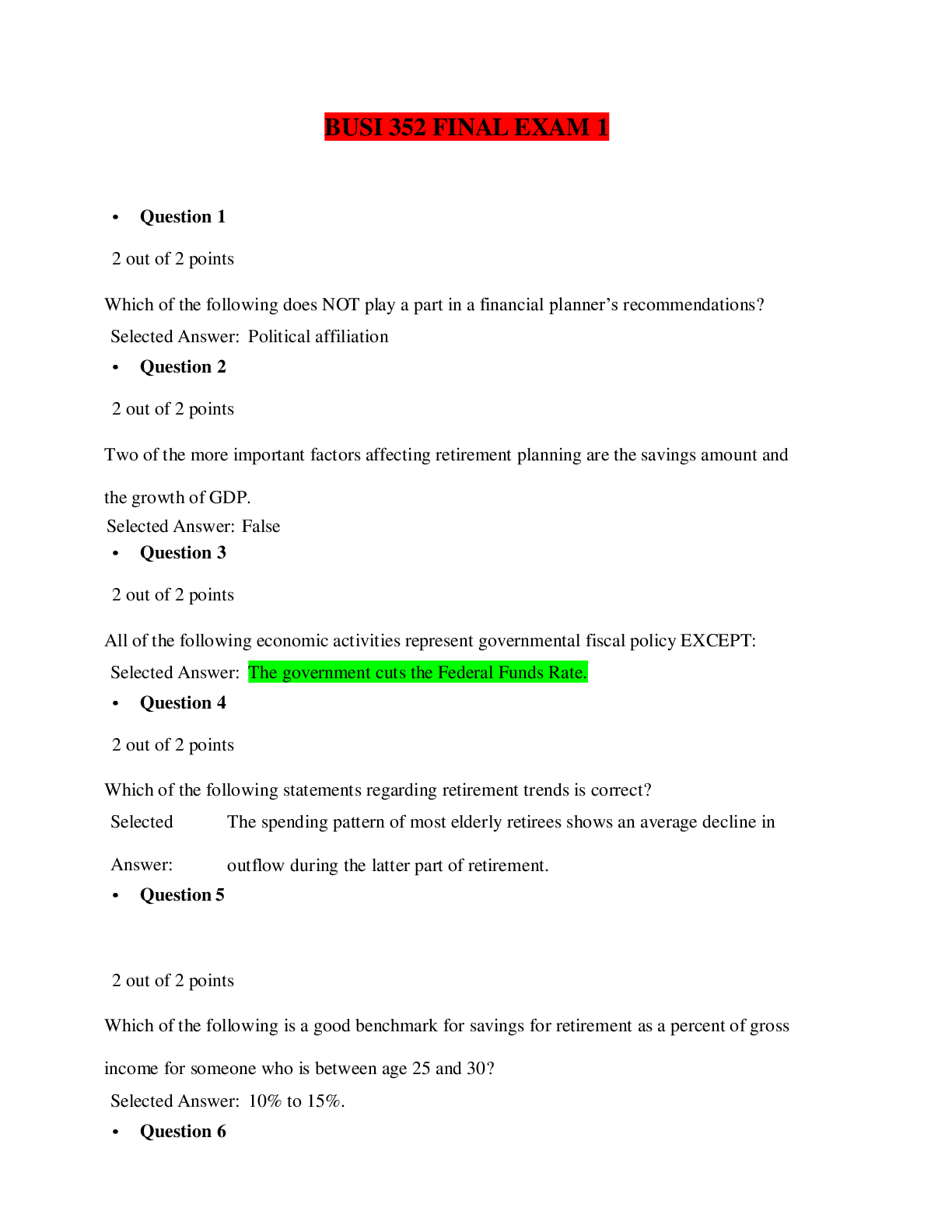
Buy this document to get the full access instantly
Instant Download Access after purchase
Add to cartInstant download
Reviews( 0 )
Document information
Connected school, study & course
About the document
Uploaded On
May 14, 2021
Number of pages
43
Written in
Additional information
This document has been written for:
Uploaded
May 14, 2021
Downloads
0
Views
56

